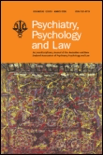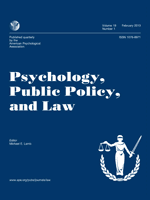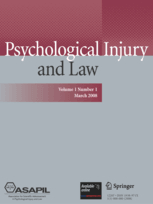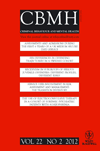
Psychiatry Psychology and Law
Scope & Guideline
Connecting Psychological Insights with Legal Frameworks
Introduction
Aims and Scopes
- Forensic Psychology and Psychiatry:
Focuses on the application of psychological principles and psychiatric knowledge to legal contexts, including assessments of competency, risk, and treatment outcomes for offenders. - Mental Health in the Criminal Justice System:
Explores issues related to mental health treatment within the criminal justice system, including the assessment and management of individuals with mental disorders involved in legal proceedings. - Impact of Legal Processes on Psychological Outcomes:
Investigates how various legal processes, such as jury decisions, police interviews, and courtroom dynamics, influence psychological outcomes for defendants, victims, and witnesses. - Interdisciplinary Approaches to Legal Issues:
Promotes collaboration among psychology, psychiatry, and legal professionals to address complex issues such as mental health advocacy, rights of individuals with mental disorders, and the effectiveness of legal interventions. - Research on Vulnerable Populations:
Examines the experiences and challenges faced by vulnerable populations, including youth, Indigenous peoples, and individuals with cognitive impairments, in the context of mental health and the law.
Trending and Emerging
- Trauma-Informed Approaches:
There is an increasing focus on trauma-informed practices within legal and mental health settings, recognizing the significant impact of trauma on individuals involved in the justice system. - Mental Health and Technology:
Emerging discussions around the intersection of mental health, technology, and legal processes, such as the use of telehealth in forensic assessments and the implications of digital evidence. - Cultural Competence in Forensic Settings:
A growing emphasis on culturally competent practices within forensic psychology and psychiatry, addressing the unique needs of diverse populations in legal contexts. - Intersections of Mental Health and Substance Use Disorders:
Research exploring the dual diagnosis of mental health and substance use disorders, particularly in forensic populations, is gaining traction as a critical area of study. - Impact of Systemic Inequalities:
An increasing attention to how systemic inequalities affect mental health outcomes and legal processes, particularly for marginalized communities, is shaping new research directions.
Declining or Waning
- Traditional Criminal Profiling:
Research focusing solely on traditional criminal profiling techniques has decreased, as newer methodologies and interdisciplinary approaches gain prominence. - General Mental Health Awareness Campaigns:
Papers that broadly address mental health awareness without specific ties to legal implications or forensic contexts are less frequent, indicating a shift towards more targeted, research-driven discussions. - Standardized Testing in Forensic Settings:
Interest in standardized psychological testing in forensic settings appears to be declining, possibly due to the recognition of its limitations and the move towards more nuanced assessment methods. - Historical Perspectives on Mental Health Law:
Studies focusing on historical analyses of mental health legislation have seen a reduction, as contemporary issues take precedence in the context of evolving legal frameworks.
Similar Journals

PSYCHOLOGY PUBLIC POLICY AND LAW
Transforming Research into Policy Impact.Psychology, Public Policy, and Law is an esteemed peer-reviewed journal published by the American Psychological Association (APA), focusing on the intersection of psychology and law. With a rich history dating back to 1995, the journal has solidified its importance in shaping legal practices and public policy through empirical research and theoretical analysis. It enjoys a prestigious ranking, notably within the Q1 category in both Law and Sociology & Political Science for 2023, reflecting its impactful contributions to these fields. Although access is not open, the journal is essential for researchers, practitioners, and students who seek to understand the psychological dimensions influencing legal decisions and policies. The journal's robust publication includes studies that provide insights on critical issues affecting society, making it a vital resource for advancing knowledge and informing policy at local, national, and international levels. With an ISSN of 1076-8971 and an e-ISSN of 1939-1528, it stands as a leading outlet for innovative research that bridges the gap between psychology, law, and public policy.

Psychological Injury & Law
Transforming Legal Perspectives on Psychological HealthPsychological Injury & Law, published by SPRINGER, stands at the forefront of interdisciplinary research, merging insights from the fields of law, psychology, and mental health. With an ISSN of 1938-971X and an E-ISSN of 1938-9728, this esteemed journal aims to address the complexities of psychological injuries within legal contexts, providing a platform for scholars to explore the intersection of legal principles and psychological well-being. Recognized for its rigor, it has achieved a Q1 ranking in both Ecology and Law, and a Q2 ranking in Psychiatry and Mental Health for 2023, demonstrating its influence and contribution to these fields. Additionally, with impressive Scopus ranks placing it in the 95th percentile within Social Sciences (Law) and the 70th percentile in Medicine (Psychiatry and Mental Health), the journal consistently showcases high-quality, impactful research that resonates with professionals, academics, and students alike. By fostering a deeper understanding of psychological injuries, it serves as an essential resource for those seeking to navigate the intricate relationships between mental wellness and legal frameworks.

Journal of Criminal Psychology
Transforming criminal justice practices through psychological innovation.Journal of Criminal Psychology, an esteemed publication by EMERALD GROUP PUBLISHING LTD, serves as a pivotal resource in the interdisciplinary study of criminal behavior through the lenses of psychology and law. Since its inception in 2011, this journal has significantly contributed to the understanding of psychological principles as they apply to crime, law enforcement, and social justice, making it a vital source for both researchers and practitioners. With a commendable ranking of Q1 in Law and Q3 in Applied and Social Psychology for 2023, the journal guarantees high-quality research findings that can influence policy and practice across these domains. Although it does not offer open access, its rigorous peer-review process ensures that every published article adheres to the highest academic standards. The Journal of Criminal Psychology not only fosters academic discourse but also drives innovation in criminal justice practices, making it essential reading for anyone dedicated to the enhancement of ethical standards in legislation and law enforcement.

Anuario de Filosofia del Derecho
Cultivating Knowledge in Legal PhilosophyAnuario de Filosofia del Derecho is a prestigious journal dedicated to the exploration and advancement of legal philosophy, published by the Ministerio Justicia, Centro Publicaciones in Madrid, Spain. With its ISSN 0518-0872, this journal serves as a critical platform for scholars, practitioners, and students interested in the intricate relationship between law and philosophy. The journal prioritizes original research articles, review papers, and thought-provoking essays that delve into contemporary issues and foundational theories within legal frameworks. Although currently not an open-access publication, it plays a vital role in stimulating discourse in legal and philosophical studies, guiding readers through complex theoretical landscapes while fostering a deeper understanding of justice and legal systems. By contributing to the discourse on legal thought, Anuario de Filosofia del Derecho stands out as an essential resource for anyone seeking to advance their knowledge in this field.

Criminal Behaviour and Mental Health
Connecting Forensic Insights with Psychological Well-beingCriminal Behaviour and Mental Health, published by WILEY, is a pivotal journal that investigates the intricate relationships between criminal behavior and psychological health. With its ISSN 0957-9664 and E-ISSN 1471-2857, this journal serves as a vital resource for researchers and professionals in the fields of forensic psychology, psychiatry, and pathology. As a recognized publication in the Q3 category across multiple disciplines, including Medicine, Psychiatry, and Psychology as of 2023, it provides an essential platform for disseminating cutting-edge research and discussions pertinent to the intersection of criminality and mental health. Although currently not available as Open Access, the journal remains an influential part of the global academic landscape with a commitment to advancing understanding in this critical area. Its historical span from 1992 to 2024 signifies a long-standing dedication to exploring the complexities of mental health in the context of criminal behavior, making it an invaluable tool for students, practitioners, and researchers alike.

LAW AND HUMAN BEHAVIOR
Exploring the Psychological Dimensions of Legal SystemsLAW AND HUMAN BEHAVIOR, published by the Educational Publishing Foundation of the American Psychological Association, is a leading interdisciplinary journal that explores the intersection of law and psychology. Established in 1977, this prestigious journal has garnered a reputation for its rigorous scholarly contributions, evidenced by its impressive impact factor and high rankings in various quartiles, including Q1 in both Arts and Humanities and Law in 2023. With its comprehensive scope encompassing critical issues in legal psychology, jury behavior, and the psychological underpinnings of legal decision-making, the journal serves as a vital resource for researchers, professionals, and students alike. Although not an open-access publication, it provides invaluable insights relevant to practitioners and academics focusing on the nuances of human behavior within legal contexts. With ongoing commitment to advancing research through its convergence of psychological and legal discourse, LAW AND HUMAN BEHAVIOR is indispensable for those aiming to bridge the gap between these crucial fields.

Forensische Psychiatrie Psychologie Kriminologie
Transforming Research into Real-World Applications.Forensische Psychiatrie Psychologie Kriminologie is a leading academic journal published by SPRINGER HEIDELBERG, specializing in the intersection of forensic psychiatry, psychology, and criminology. With an ISSN of 1862-7072 and E-ISSN 1862-7080, this journal has built a reputable place in the academic community, featuring essential research that informs the critical dialogue on legal and psychological practices as they pertain to mental health and criminal behavior. Indexed in Scopus, it holds a diverse range of impact factors across multiple disciplines, including a Q2 ranking in Law and notable placements within Applied Psychology and Psychiatry and Mental Health. The journal's commitment to advancing evidence-based practices and understanding of forensic mental health is evident from its broad editorial scope, making it a vital resource for researchers, clinicians, and students alike. The journal spans a timeline from 2007 to 2024, ensuring that it provides up-to-date insights into evolving methodologies and findings within this critical field.

PSYCHOLOGY CRIME & LAW
Innovating Research at the Crossroads of Crime and PsychologyPSYCHOLOGY CRIME & LAW, published by Routledge Journals, Taylor & Francis Ltd, is a premier academic journal dedicated to the intersection of psychology, criminology, and the law. With an ISSN of 1068-316X and an E-ISSN of 1477-2744, this journal provides a critical platform for the dissemination of cutting-edge research and innovative methodologies in the fields of psychology, forensic medicine, and legal studies. Spanning over three decades (1994 to 2024), it holds impressive Scopus rankings, placing it in Q1 and Q2 quartiles for its contributions to law and forensic medicine, highlighting its standing within the academic community. PSYCHOLOGY CRIME & LAW is particularly noted for addressing contemporary issues at the crossroads of human behavior and legal standards, making it essential reading for scholars, practitioners, and students alike. While the journal is not open access, it offers valuable insights into a variety of topics, from criminal psychology to the implications of mental health in legal contexts, ensuring that it remains an influential resource for those engaged in research and professional practice.

Journal of Criminal Law
Illuminating Pathways in Criminal Law ScholarshipWelcome to the Journal of Criminal Law, a prestigious publication in the field of legal studies, expertly published by SAGE Publications Ltd. With a rich history that dates back to 1937, this journal has been a vital platform for disseminating innovative research and critical analyses pertaining to criminal law and justice issues. The journal boasts a commendable Q2 ranking in the Law category for 2023, placing it among the top tier of legal publications. It is recognized for its impactful contributions, as indicated by its impressive Scopus Rank of #346 out of 1025 in the Social Sciences - Law category, positioning it within the 66th percentile. Although it does not currently offer open access options, researchers, professionals, and students will find a wealth of rigorously peer-reviewed articles that address contemporary challenges and developments in criminal law. Based in the United States, the journal is committed to fostering scholarly dialogue and advancing understanding in an ever-evolving legal landscape.

Psychology and Law
Bridging psychology and law for a deeper understanding.Psychology and Law, published by Moscow State Psychological & Pedagogical University, is an open-access journal dedicated to advancing knowledge at the intersection of psychology and legal studies. Since its establishment in 2011, the journal has provided a platform for high-quality research that addresses critical issues in applied, clinical, experimental, cognitive, and social psychology. Despite ranking in the Q4 quartile for various psychology categories in 2023, this journal remains committed to fostering insightful discussions and contributions to the field. Researchers and practitioners from diverse backgrounds are encouraged to explore its accessible content, which aims to enhance our understanding of psychological principles within legal contexts. The journal's ISSN is 2222-5196, and it primarily serves an international audience, promoting scholarly engagement and interdisciplinary collaboration. As the field evolves, Psychology and Law continues to be a vital resource for those seeking to bridge the gap between psychological research and legal practice.